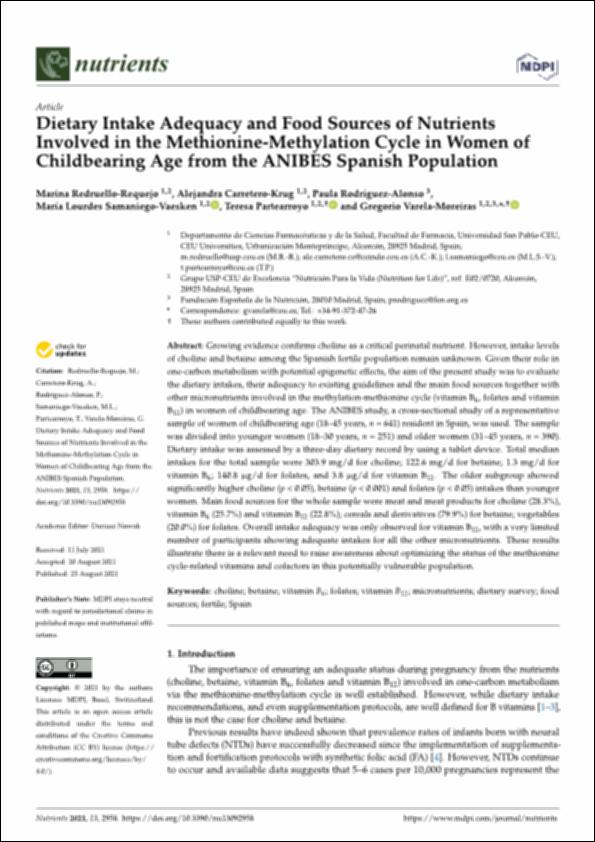Por favor, use este identificador para citar o enlazar este ítem:
http://hdl.handle.net/10637/15062Dietary Intake Adequacy and Food Sources of Nutrients Involved in the Methionine-Methylation Cycle in Women of Childbearing Age from the ANIBES Spanish Population
| Título : | Dietary Intake Adequacy and Food Sources of Nutrients Involved in the Methionine-Methylation Cycle in Women of Childbearing Age from the ANIBES Spanish Population |
| Autor : | Redruello Requejo, Marina Carretero Krug, Alejandra Rodríguez Alonso, Paula Samaniego Vaesken, María de Lourdes Partearroyo Cediel, Teresa Varela Moreiras, Gregorio |
| Materias: | Choline; Betaine; Vitamin B6; Vitamin B12; Micronutrients; Dietary survey; Food sources; Fertile |
| Editorial : | MDPI |
| Citación : | Redruello-Requejo, M.; Carretero-Krug, A.; Rodríguez-Alonso, P.; Samaniego-Vaesken, M.L.; Partearroyo, T.; Varela-Moreiras, G. Dietary Intake Adequacy and Food Sources of Nutrients Involved in the Methionine-Methylation Cycle in Women of Childbearing Age from the ANIBES Spanish Population. Nutrients 2021, 13, 2958. https://doi.org/10.3390/nu13092958 |
| Resumen : | Growing evidence confirms choline as a critical perinatal nutrient. However, intake levels of choline and betaine among the Spanish fertile population remain unknown. Given their role in one-carbon metabolism with potential epigenetic effects, the aim of the present study was to evaluate the dietary intakes, their adequacy to existing guidelines and the main food sources together with other micronutrients involved in the methylation-methionine cycle (vitamin B6, folates and vitamin B12) in women of childbearing age. The ANIBES study, a cross-sectional study of a representative sample of women of childbearing age (18–45 years, n = 641) resident in Spain, was used. The sample was divided into younger women (18–30 years, n = 251) and older women (31–45 years, n = 390). Dietary intake was assessed by a three-day dietary record by using a tablet device. Total median intakes for the total sample were 303.9 mg/d for choline; 122.6 mg/d for betaine; 1.3 mg/d for vitamin B6; 140.8 g/d for folates, and 3.8 g/d for vitamin B12. The older subgroup showed significantly higher choline (p < 0.05), betaine (p < 0.001) and folates (p < 0.05) intakes than younger women. Main food sources for the whole sample were meat and meat products for choline (28.3%), vitamin B6 (25.7%) and vitamin B12 (22.8%); cereals and derivatives (79.9%) for betaine; vegetables (20.0%) for folates. Overall intake adequacy was only observed for vitamin B12, with a very limited number of participants showing adequate intakes for all the other micronutrients. These results illustrate there is a relevant need to raise awareness about optimizing the status of the methionine cycle-related vitamins and cofactors in this potentially vulnerable population. |
| URI : | http://hdl.handle.net/10637/15062 |
| Derechos: | http://creativecommons.org/licenses/by-nc-nd/4.0/deed.es OpenAccess |
| ISSN : | 2072-6643 |
| Fecha de publicación : | 25-ago-2021 |
| Aparece en las colecciones: | Facultad de Farmacia |
Los ítems de DSpace están protegidos por copyright, con todos los derechos reservados, a menos que se indique lo contrario.


